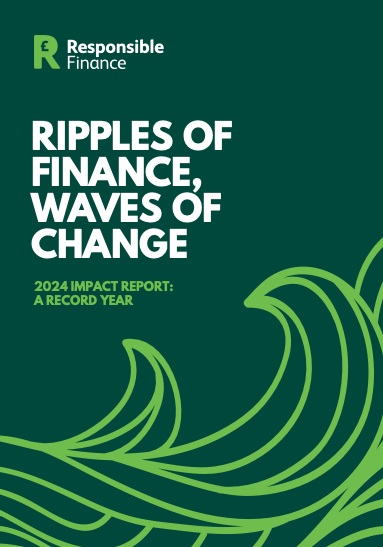20th May 2024: New figures reveal 14% jump to £287m lent to under-served businesses, social enterprises and households in 2023, creating 6,571 jobs and 3,829 enterprises and saving people £29m in interest.
 The UK’s not-for-profit, ‘community development’ lenders lent £287m to customers who would otherwise have been excluded from affordable finance in 2023, a 14% increase on 2022, and the highest total lending in their 30 year history.
The UK’s not-for-profit, ‘community development’ lenders lent £287m to customers who would otherwise have been excluded from affordable finance in 2023, a 14% increase on 2022, and the highest total lending in their 30 year history.- Helped households save £29m in interest they would have paid to a high-cost lender, by lending £66m (a 23% increase on 2022) to 85,208 people
- Lent £102m (a 26% increase on 2022) to 4,546 start-ups and established small businesses, creating 6,411 jobs and safeguarding 5,402 jobs. 99% of the small businesses they lent to had not been able to access finance from a bank or other lender
- Lent £119m to 371 social enterprises, safeguarding and creating a further 322 jobs
- CDFIs helped 143,050 people, many the ‘working poor’, identify over £601m in benefits they were due but not claiming in 2023
- They distributed £416,600 in no-strings attached NatWest Group and Responsible Finance hardship grants of £50 to £100 to people who had applied for a small sum loan but been turned down
- CDFIs created 3,829 new enterprises in 2023, and helped 662 firms to scale-up
- A record number of new investors and partners supported CDFIs’ growth, including mainstream banks, family offices, trusts and foundations, technology companies and business and consumer groups – in 2023, CDFIs raised £183 million
Theodora Hadjimichael, CEO of Responsible Finance, said:

“There is a lot for community development finance institutions to celebrate this year. CDFIs invested a record amount into underserved places and people, unlocking potential for businesses, social enterprises and households. A record number of new investors and partners supported CDFIs’ growth, including mainstream banks, family offices, trusts and foundations, technology companies and business and consumer groups.
“There is a wave of momentum behind CDFIs and recognition that their expertise, support and reach creates opportunities for those who other finance providers turn down or can’t reach. As evidence of this, CDFIs outperform the mainstream by serving higher levels of women, ethnic minorities and areas of deprivation. They have also blazed the trail for support like benefits checkers, which other lenders are now adopting.
“We are grateful to our member CDFIs who turn every inch of support they get into a mile of impact. We are also grateful to all of our partners for their time, funding and advocacy for Responsible Finance and our sector. Yet our impact could be bigger. More people and businesses could be thriving. Millions of people and hundreds of thousands of enterprises have huge potential but are overlooked. We need to secure the policy tools and long-term investment that will scale the CDFI sector to unlock sustainable and inclusive economic growth.”
Personal-lending CDFIs
A better today and a better tomorrow for financially-vulnerable households – in 2023:
- Personal lending by CDFIs increased by 23% to £66m
- Average personal loan: £726. CDFIs saved people an average of £340 in interest on each average loan
- This helped households save a total £29m in interest compared with borrowing from a high-cost lender
- 89% of personal loans were made to customers outside London
- 55% were to people who had previously used a high-cost credit provider
- 67% of personal loans were made to people describing their gender as female
- The top three reasons for borrowing were for furniture and electrical items; paying for essential bills and expenses; paying for an appliance/ white goods
- Because many CDFIs offer benefits calculators built in to their application process when people apply for credit, they identified £350 per person per month in unclaimed benefits (£4,200 each per year, totalling £601m)
- They provided £416,600 in grants of £50 to £100 to more than 4,000 people through the NatWest Group and Responsible Finance Hardship Grants Programme
Enterprise lending CDFIs
Unleashing waves of entrepreneurial potential – in 2023:
- CDFIs lent £102m (a 26% increase on 2022) to 4,546 small businesses and startups (41% more than in 2022), of which:
- They lent £42.2m to 3,725 start-ups (average loan size: £11,354) and £59.8m to 821 established SMEs (average loan size: £72,883)
- 99% of the businesses which borrowed from CDFIs in 2023 had previously been declined by another lender
- 98% of businesses supported were based outside London
- 60% of businesses supported were based in the UK’s 35% most disadvantaged areas
- 41% of CDFI business loans were made to women-led start-ups and businesses (just 16-21% of UK businesses overall are led by women)
- 24% of business loans were made to ethnic minority-led start-ups and businesses (only 6% of UK SMEs are ethnic minority led)
CDFIs are all social enterprises themselves; some specialise in social enterprise lending
Creating thriving places: CDFI lending to social enterprises – in 2023:
- CDFIs and social banks lent £119m to 371 social enterprises
- 93% of social enterprises supported were based outside London
- 38% of social enterprises loans were made in the UK’s 35% most disadvantaged areas
- 47% of CDFI social enterprise loans were made to women-led social enterprises
The report is supported by NatWest Group. Brian Holland, Director, Customer Vulnerability, Retail Controls and Remediation, NatWest Group, said:
ENDS
The report includes many case studies featuring businesses, social enterprises and people who have been supported by community development finance institutions.
Media enquiries: contact Jamie Veitch, 07904 272 200 / [email protected]
